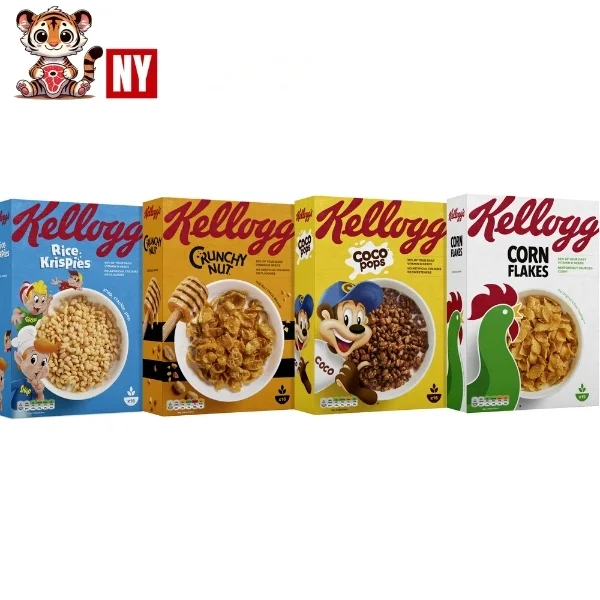Is Kellogg’s Cereals Halal in America?
What Does “Halal” Mean?
Halal refers to food and drinks that are permissible for Muslims to consume according to Islamic dietary laws. Foods that are halal must not contain any prohibited (haram) ingredients, such as pork, alcohol, or certain types of animal products that do not meet Islamic slaughter requirements. Halal foods must also be prepared according to Islamic guidelines. It’s essential for Muslim consumers to ensure that the products they consume comply with these standards.
Are Kellogg’s Cereals Halal in America?
The answer to whether Kellogg’s cereals are halal in the U.S. varies depending on the product. While many of Kellogg’s cereals are halal-certified, meaning they adhere to Islamic dietary requirements, not all of their products meet these standards. Some of Kellogg’s cereals contain ingredients that may not be considered halal, such as gelatin or non-halal derived vitamin D3. However, many of the popular cereals from Kellogg’s are halal-certified, providing options for Muslim consumers who want to enjoy their products.
Halal-Certified Kellogg’s Cereals
Kellogg’s has made an effort to cater to Muslim consumers by offering a range of halal-certified cereals. This means that these products have undergone certification by recognized halal certification bodies, ensuring that all ingredients and the production process meet the required standards. Here are some Kellogg’s cereals that are commonly halal-certified:
- Corn Flakes – A breakfast staple, Kellogg’s Corn Flakes are often halal-certified, as long as they do not contain non-halal ingredients like vitamin D3 derived from animals.
- Rice Krispies – This classic cereal is another option that is frequently halal-certified, ensuring that it doesn’t contain alcohol-based flavorings or non-halal ingredients.
- Froot Loops – Froot Loops are also halal-certified in some cases, depending on the specific product and its ingredients, such as colorings that are derived from halal sources.
- Special K – Many varieties of Special K are halal-certified, but it’s important to check the ingredients to confirm that no non-halal additives like gelatin are used.
While these are examples of cereals that can be found with halal certification, it is important to verify that the specific box of cereal you are purchasing has been certified halal.
Key Ingredients to Watch Out For
Certain ingredients found in Kellogg’s cereals may not meet halal requirements. Here are some of the most important ingredients to look out for:
1. Vitamin D3
Vitamin D3 is often used in cereals for nutritional purposes. However, it can be derived from either plant-based sources or animals. If the vitamin D3 is derived from fish liver oil or non-halal animal sources, it may not be considered halal. Look for cereals that specify plant-based or halal-certified vitamin D3.
2. Gelatin
Gelatin is a common ingredient in many processed foods, including some cereals, and is often used as a stabilizer or thickening agent. However, gelatin is typically derived from animal by-products, particularly pork or non-halal beef, making it unsuitable for Muslim consumers. Halal-certified cereals will either not use gelatin or use plant-based alternatives.
3. Alcohol-based Ingredients
Certain flavorings or additives in cereals may be derived from alcohol. These ingredients are considered haram in Islamic dietary laws. While Kellogg’s generally avoids alcohol-based ingredients in its cereals, it’s still essential to check the labels carefully to confirm that no alcohol-derived substances are present.
4. Enzymes and Additives
Some enzymes and additives used in cereal production may come from animal sources. If these enzymes are derived from non-halal animals, the cereal will not meet halal standards. It’s essential to ensure that these additives are certified halal.
How to Find Halal-Certified Kellogg’s Cereals
If you’re looking for halal-certified Kellogg’s cereals, here are a few tips:
1. Look for Halal Certification on the Packaging
The simplest way to identify halal cereals is to check the packaging for a halal certification logo or mark. This symbol indicates that the product has been verified by a recognized halal certification authority.
2. Check Kellogg’s Website
Kellogg’s provides detailed information about its products on its official website. You can check if a specific cereal is halal-certified or contact the company for more details.
3. Use Online Resources
There are many online resources and databases that list halal-certified products, including cereals. These websites compile information on which brands and products are halal, making it easier for consumers to find suitable options.
Is Kellogg’s Committed to Halal Standards?

Kellogg’s has recognized the importance of catering to Muslim consumers and has made efforts to provide halal-certified cereals in the U.S. The company works with halal certification bodies to ensure that their products meet the necessary standards. While not all Kellogg’s cereals are halal-certified, the company has been responsive to the demand for halal products and continues to expand its range of halal options.


